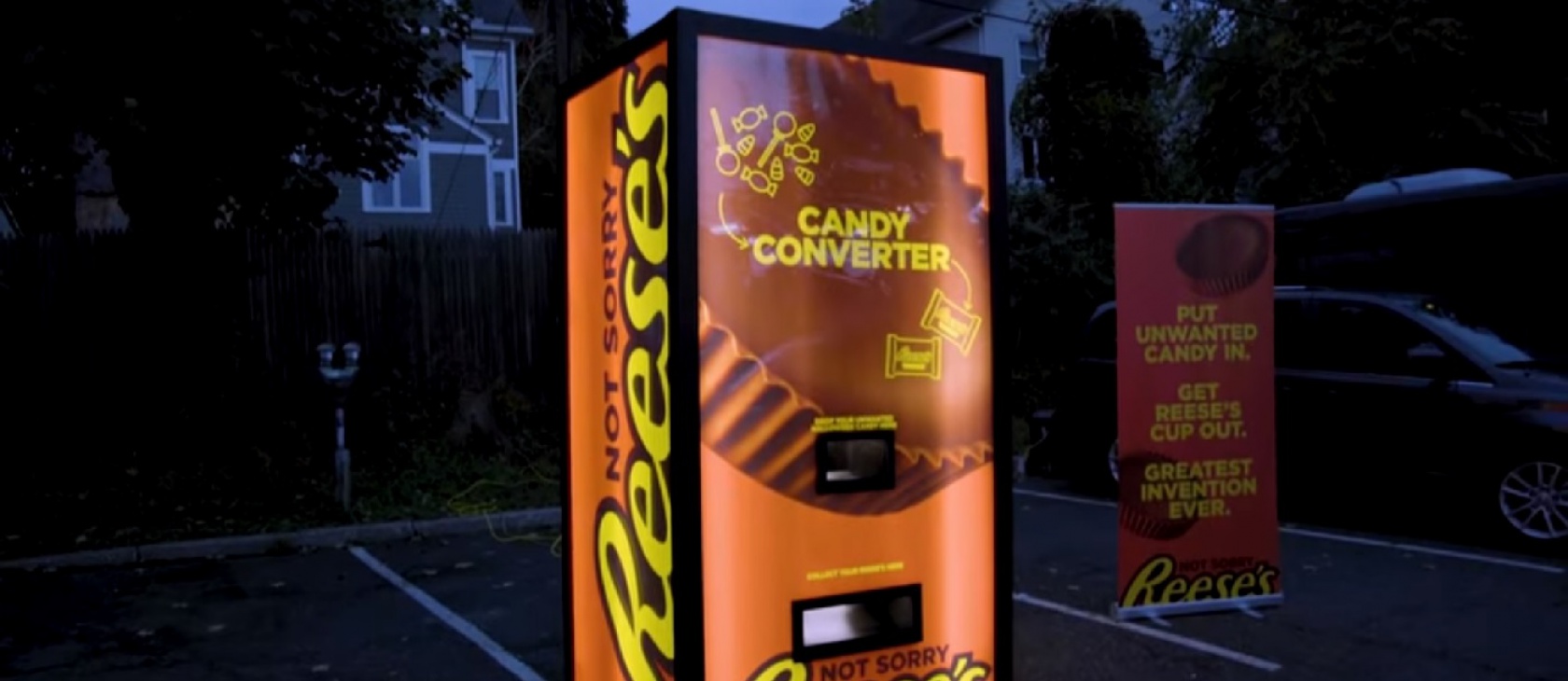Have you ever been disappointed by the candy you received from trick-or-treating? Not a sucker for jawbreakers? Think Smarties are dumb? Do Jolly Ranchers leave you sour? You now have two options: Either one will maximize your happiness and benefit others – one of them aiding soldiers overseas.
Reese’s has invented a machine that will let you exchange your unwanted Halloween haul for Reese’s Peanut Butter Cups. Simply deposit your “disappointment” in the slot and receive an equivalent bulk of Reese’s. (It is unclear what exchange rate the company employs.) The machine can be seen in the video below:
As with anything else, terms and conditions apply: Their offer is good at only one location – Washington Square Park in New York City – and only for five hours on Halloween day.
If you are unable to take advantage of that offer, you have another opportunity to exchange less desirable Halloween candy and help others: The Halloween Candy Buy Back. The nationwide program, often held at dentists’ offices, will pay children $1 for each pound of Halloween candy they bring in – and they regularly hand out toothbrushes, dental coupons, and sugar-free candy, as well. The program, now in its thirteenth year, partners with a veterans organization to package and ship the candy to soldiers deployed overseas, giving them a taste of home. “More than 130 tons of candy has been collected, over the years,” the organization states.
The Invisible Hand delivers again
Either option will maximize your personal happiness. Jay Richards often begins his Acton University lectures with a story from his childhood: A schoolteacher taught his class a lesson by giving everyone a small toy. Then, the teacher gave them the right to trade with people in their row. Then finally, they could trade with everyone in their room. At each level, the teacher asked the children how much they enjoyed their toys and, unsurprisingly, they liked the toy they chose more than the one a central authority selected for them.
These private acts of free exchange benefit all parties involved: Reese’s gets publicity as the GOAT (Greatest Of All Time) of Halloween candy. Children (perhaps not entirely free of parental coercion) get cold, hard cash and dental items while participating in the blessing of giving (Acts 20:35). Soldiers in the middle of a hateful and hostile world get sweets and the knowledge that the public they fight to protect love and support them.
Both of these options came about without government direction, intervention, or involvement. Private individuals spontaneously saw a need and filled it – in some cases with an eye to their own advantage (Reese’s), in others with concern for others. Under a free system of exchange, everyone has the right to trade what they have for something they value more.
The miracle of the market forces people to satisfy their desires by serving others. Adam Smith wrote in his Theory of Moral Sentiments that, although people pursue only “the gratification of their own vain and insatiable desires, they divide with the poor the produce of all their improvements. They are led by an invisible hand … and thus without intending it, without knowing it, advance the interest of the society.”
Halloween would look much different if it followed other economic models. Under Marxism, a bureau would choose the kind and amount of Halloween candy every trick-or-treater would receive nationwide (and the Politburo would promptly embezzle it).
Under the most participatory theory of democratic socialism, citizens would vote for their favorite candy, and everyone would get Reese’s cups – including those with peanut allergies.
Under either system, the nation would run out of chocolate and peanut butter within three years. (This is no mere speculation; Venezuela halted production of Coca-Cola in 2016 due to a lack of sugar.)
Marginal utility, gluttony, and ‘the hunger for eternity’
In the affluent West, the greatest problem may be too much candy – a problem related to a concept economists call “marginal utility.” The more you have of any item, the less each one adds to your overall well-being. Seeing one neighbor drop a Reese’s cup into your bag may bring great satisfaction, a second a bit less. Receiving the fifty-first Reese’s cup of the night may bring boredom. (Some, specifically Joseph Schumpeter, trace the idea of marginal utility back to the Christian philosophers known as the scholastics, especially the late scholastics’ theories of value.)
The same concept applies to eating candy: The first piece brings a certain indulgent joy. The second and third add variety. The fifty-first piece of candy, furtively eaten an hour after everyone else as gone to bed, brings a stomachache, shame, and possibly the need for an intervention. (This author has done previous research on this topic.)
Economists call this diminishing marginal utility; the early church fathers call it gluttony. The fathers explain how an undue concern for the flesh dulls the things of the spirit, and the economists explain how each additional unit of consumption fails to bring peace or fulfillment. After a certain point, any kind of candy will prove superfluous – a microcosm of the world-weariness experienced in a broader scope by the Preacher in the Book of Ecclesiastes (1:1-2). Secular economists prove that earthly material cannot bring satisfaction and point to true fulfillment only in a world beyond this one. “Transiency is stamped on all our possessions, occupations, and delights,” the British Baptist minister Alexander Maclaren (1826-1910) wrote in his commentary on Ecclesiastes. “We have the hunger for eternity in our souls, the thought of eternity in our hearts, the destination for eternity written on our inmost being, and the need to ally ourselves with eternity proclaimed by the most short-lived trifles of time.”
(Photo credit: Reese's.)














